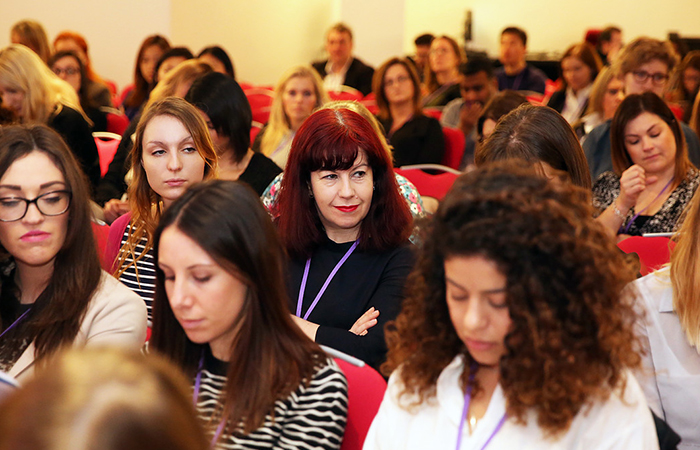By Hanna Mansson
On Saturday the 19th of November it was Women’s Entrepreneurship Day. This is a day dedicated to celebrating female entrepreneurs and inspiring girls and women everywhere to feel empowered to follow their entrepreneurial dreams. We need this day, because even though some progress is happening, female CEOs only get 2.7 percent of all venture funding and women of color only 0.2 percent. Worldwide, just 25%-33% of all businesses are run by women.

There are many reasons for why these numbers are so low, whether it is gender-bias from investors, social norms influencing career choices, a lack of female role models, discrimination, or the gender pay gap. In the technology sector in particular, it is a well-known fact that women are the minority, and research shows little progress coming our way. According to a recent study from Opium Research, whilst 20% of UK males aged 16-25 want to set up a business in the technology sector, the number for women is just 2%.
Again – we need this day, but we also need more than a day. A few weeks ago I attended the conference Women of Silicon Roundabout where I met many talented and inspiring women, clearly dedicated to their business and their cause. Speaking to these women, I found that there were two sometimes contradictory emotions taking centre stage. The message that was being communicated was ‘fight for it, keep positive, be brave, you are great” – not too far away from from the now legendary feminist ‘We can do it” message, if only re-written to an individual level.

The other emotion? The actual reality of the gender pay gap, gender bias and discrimination. Much like the second-wave feminists of the 1960s argued – many women felt it is impossible to separate the personal from the political. As women, whilst we keep our heads high and fight to succeed and to get the recognition we deserve, the fight to even the playing field is equally important.
With that in mind, I want to set out some suggestions, that I hope will offer inspiration, as well as some practical approaches to personal/political influence and change.
The Inspiration bit.
The Founders Talk at the Women of Silicon Roundabout event was certainly inspiring as female founders Sue Black, Somayeh Aghnia, Jessica Butcher, Tamara Sword, Hanna McCloskey and Jayne Coulthard spoke passionately about starting a business.

I have summarised some of the very actionable advice that came out of the session, for women looking to set up their own company.
- Network, network and network. Go to tech and startup events, meet people, share experiences and skills. You might meet a potential co-founder, mentor or supportive friend. There are plenty of great London based women-only meet ups such as Geek Girls and Blooming Founders.
- Ask for funding. Once you have a solid business plan do not shy away from looking for funding. You need to hustle, don’t hold back. There are a lot of options for raising money out there, including female focussed investor funds such as 500 Women and Astia Angels.
- Solve a real problem. Many of the panel members described this as the main reason why they get out of bed in the morning. Being passionate about your product is essential to your success.
- Find a co-founder who complements your skills. If you want to co-found, it’s a good idea to find a co-founder who has different skills and experience to yourself. So if you’re in tech you might look at someone with marketing experience and vice versa.
- Start in the evenings, then go to part time. Balancing your day job with starting a business is hard work, especially if you are also the prime caretaker of your children. Explore the options available to you to let you focus on your passion and share responsibilities with your family.
- Take risks. No risks, no rewards, at some point you’ll have to leave your day job.
- Attend accelerator programs. These are great for mentoring, support, introductions, learning new skills and meeting people who have been through it all before. Ogunte (London) and Women Startup Lab (Silicon Valley) are both dedicated to female founders.
- Employ the right people. When it comes to recruiting, be thorough and know what you’re looking for. Letting people go is not fun and the right team is critical so pick wisely.
The personal/political bit.
I called up one of the panel members, Hanna McCloskey, to take the conversation further. Hanna is the founder and CEO of the organisation Fearless Futures, who engage girls in school and women and men in the workplace with critical thought to understand and challenge the root causes of inequalities and to grow powerful new leadership for transformative change.

It’s an understatement to say that Hanna has plenty of experience in empowering women to challenge inequality in a discriminative landscape. For her, it starts with education and ends with action:
- Educate yourself. Understanding what the inequalities are in your industry and where they are derived from is key to feeling empowered to make a difference. Statistics are powerful ammunition and can give you the confidence to influence change.
- Stand up for yourself. If faced with sexism from investors or in other professional environments you have to speak up. Know your voice deserves to heard.
- Embrace solidarity. Sometimes it is easier to stand up for someone else than for yourself. If a female colleague is being spoken over in a meeting, stand up for her. You can do this subtly, by simply taking the conversation back to her point. No woman’s life experience is identical – racism, classism, homophobia and ableism connect with sexism in complex ways. Think beyond gender – and don’t just stand up for women like you.
- Find your allies. It’s hard to change things by yourself. Find other women with similar experiences and find support and action in each other.
- Influence company policy. Ask HR about their equality policy. If there isn’t one, ask for one (or create one if you are the founder). It’s important to embed a mindset of commitment to equality in the early days of a company’s growth.
- Recruit proactively. There’s a lot of complacency in recruiting and you often hear that ‘no women applied’. If no women applied, go look for them. Explore spaces you haven’t looked in before. Be proactive.
- Find digital solutions to social problems. Embrace tech as a means for social change. If you can make a product that can help tackle a social problem you are passionate about, you can change the world whilst living your dream (and hopefully making the big bucks).
- Get involved. If you really want to make a difference to yours and other women’s situation and start influencing legislation – join a feminist organisation and get involved.
- There’s support. More and more female-only accelerator programmes and investors are appearing. Seek them out.
Entrepreneurship & Tech
Entrepreneurship and technology are closely related in today’s society as more and more products and services go digital. Therefore, to tackle inequality in the startup world, we also need to look at empowering more women to get into the field of technology. Asking one of our female developers, Natalie Loh, about her experiences of being a woman in tech, she expresses frustration surrounding stereotyping.

‘I think we’re all guilty of harbouring and perpetrating sexist sentiments because of all the stereotypes attached to women in STEM – myself included.’ But Natalie is confident this can change. ‘To break the stereotypes we need to increase representation. Not only in showcasing exceptional female engineers and female leaders in tech, but also women just starting out, women who might not yet be successful.’ She goes on to explain, ‘When you have lack of representation, the fear of being a bad example can be very pressurising. When you don’t feel represented, you feel even more scared of portraying a bad image because your actions seem to speak for a larger group, rather than you as an individual.’
Natalie’s thoughts on increasing representation are echoed by many successful female entrepreneurs. To finish off, I’d like to leave you with this quote from Emma Heal, Retail Director at Graze: “We need to ensure companies make it a top priority to have strong female leadership well represented at every level”.
Let’s all go make it happen.